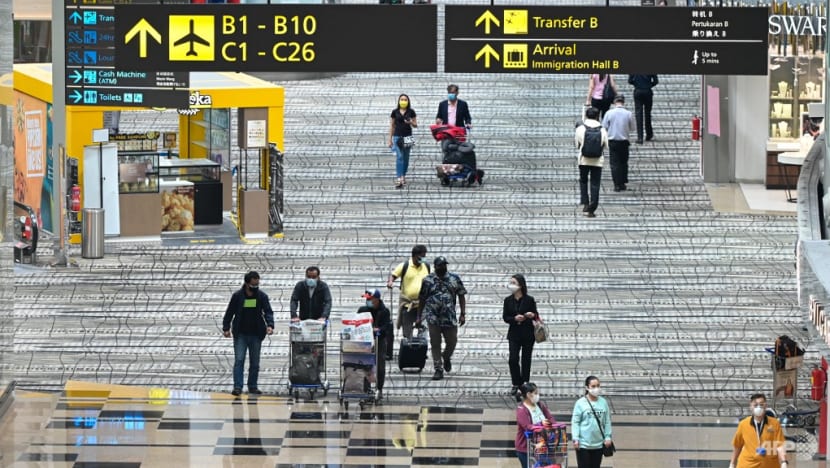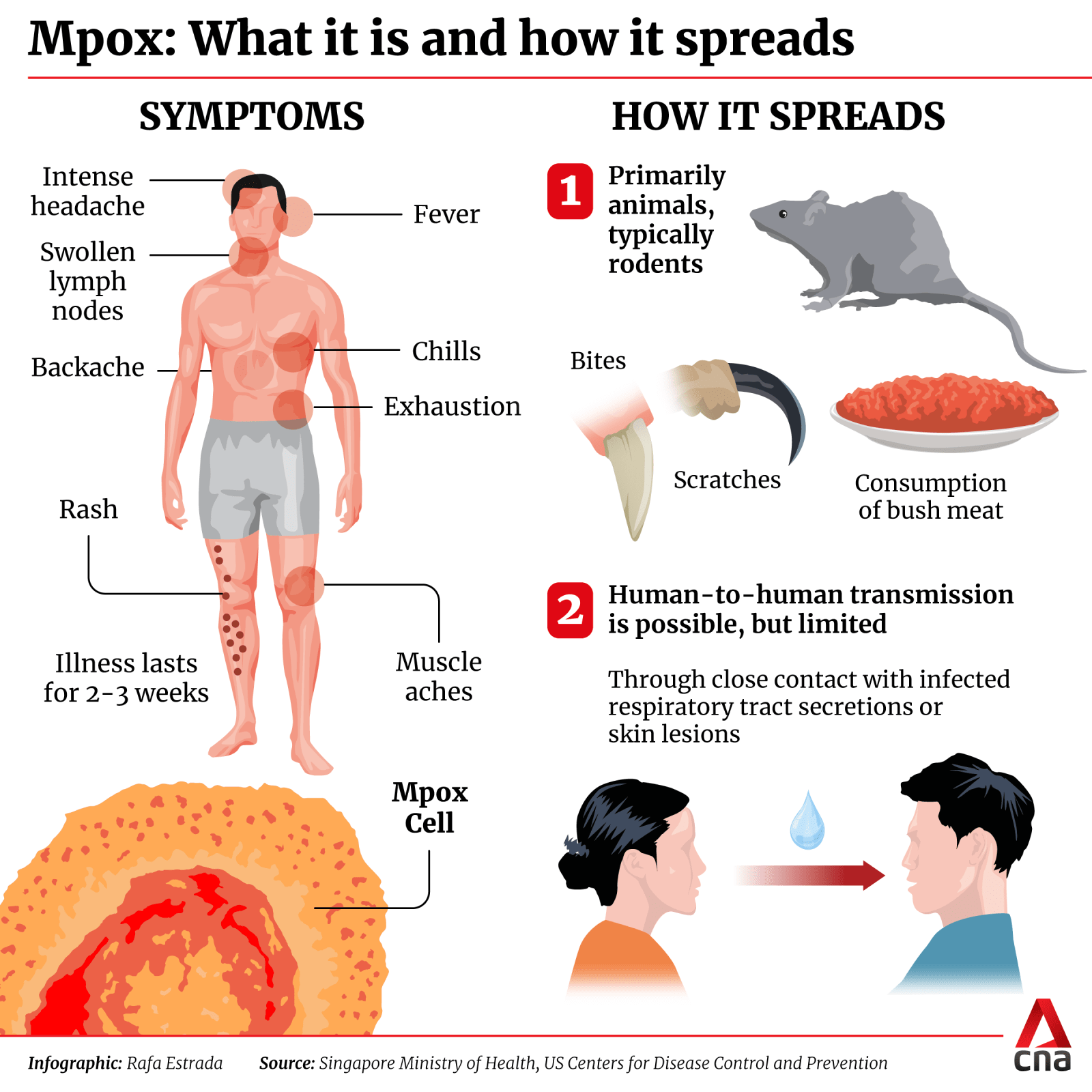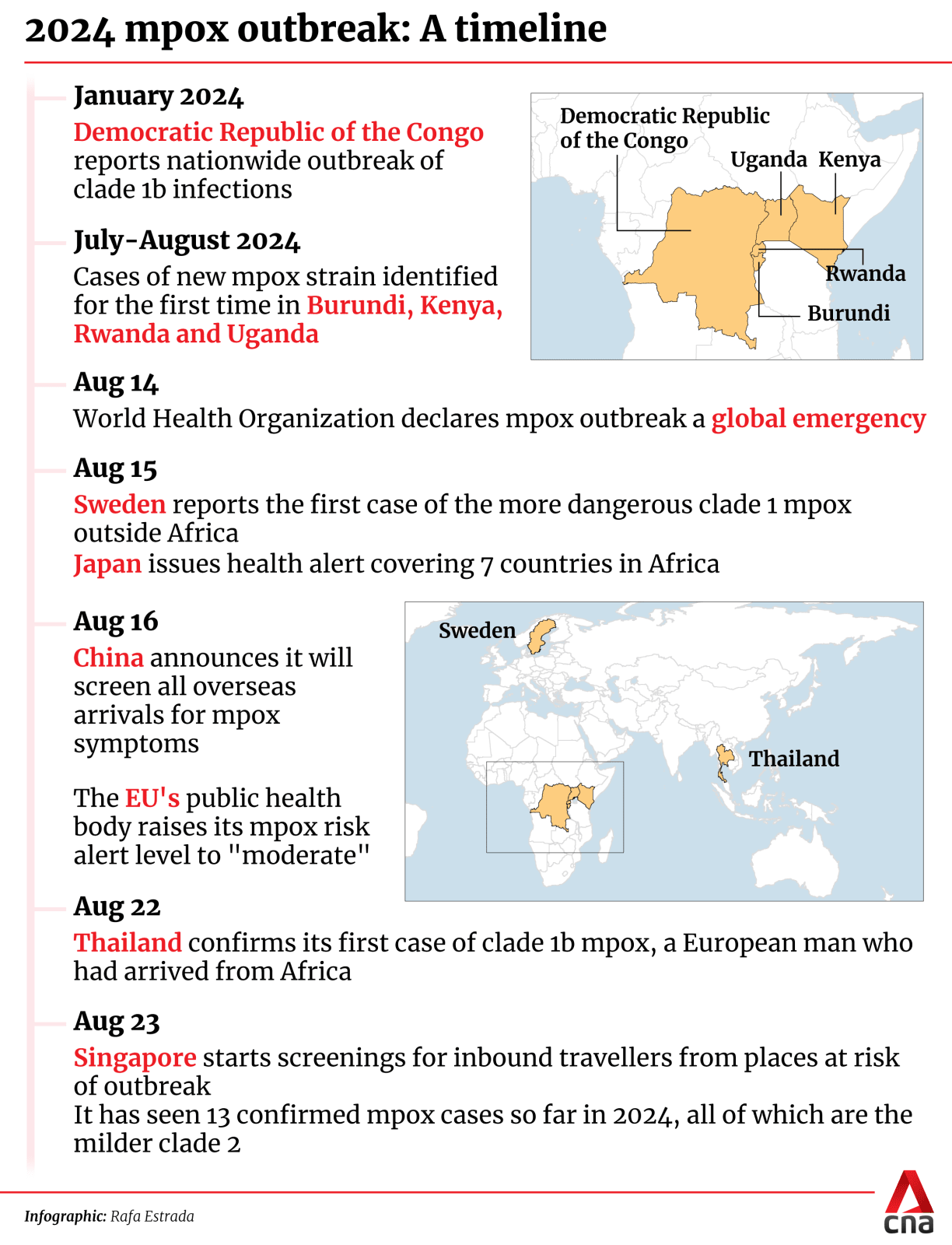Singapore steps up mpox precautionary measures; temperature and visual screening at air, sea checkpoints
Thirteen confirmed mpox cases have been detected in Singapore so far this year, all of which are of the less severe Clade 2 infections.

Travellers wearing face masks are seen at Changi Airport in Singapore on Jan 12, 2022. (Photo: AFP/Roslan Rahman)

This audio is generated by an AI tool.
SINGAPORE: Temperature and visual screening will be conducted from Friday (Aug 23) for certain inbound travellers and crew at Changi and Seletar airports as a precautionary measure against mpox.
Such screening will be conducted for those arriving on flights from places which may be exposed to the risk of mpox outbreaks, said the Ministry of Health (MOH) on Thursday night.
So far, there are no direct flights between Singapore and any mpox outbreak country.
Similar screening measures will also be implemented at sea checkpoints for crew and passengers arriving on ships from mpox affected areas.
These precautionary measures will enhance Singapore's "surveillance capabilities" against mpox at its borders, said MOH.
Health advisories have been put in place at air checkpoints so that travellers will take the necessary personal precautions to avoid being infected.
"Travellers are strongly advised to adhere to the advisory, especially if they are travelling to and from affected countries.
"Travellers who have fever, rash and/or symptoms compatible with mpox will be referred for medical assessment," said MOH.
As of Thursday, 13 confirmed mpox cases have been detected in Singapore this year, all of which are of the less severe Clade 2 infections.
There have been no Clade 1 cases detected in Singapore to date.
While mpox has been known for decades, a new deadlier and more transmissible strain - known as Clade 1b - has driven the recent surge in cases.
Clade 1b causes death in about 3.6 per cent of cases, with children more at risk, according to the World Health Organization (WHO).

WHO in August declared mpox a global public health emergency for the second time in two years, following an outbreak in the Democratic Republic of Congo that spread to neighbouring countries.
The Health Ministry said that it is monitoring the global situation very closely.
"Thus far, the outbreak remains generally confined to Africa, with two cases of the more severe mpox Clade I reported in Sweden and Thailand. There are currently no reports of local spread in these two countries," said MOH.
Thailand on Thursday afternoon confirmed Asia's first known case of the new, deadlier Clade 1b strain.
The 66-year-old European man landed in Bangkok from Africa on Aug 14 and was sent to hospital with mpox symptoms.
Thai authorities are monitoring 43 people who have been in close contact with the man. Monitoring must be done for 21 days.
PRECAUTIONARY MEASURES
"The prevailing precautionary measures to detect and manage mpox cases remain unchanged," said MOH.
All travellers are required to report mpox-related symptoms like fever or rash, as well as their travel history, through the SG Arrival Card.
Medical practitioners have to notify the Health Ministry of all suspected mpox cases.
Suspected cases will be isolated in hospital, so that they can be further assessed and tested for the disease.
Contact tracing is conducted for all confirmed cases of mpox to limit community transmission.
All identified contacts will be informed to monitor their health for symptoms of mpox and to seek medical advice if unwell. Close contacts will also be offered vaccination to reduce the risk of mpox infection.
MOH noted that its current vaccination approach "focuses on persons at high risk of infection, such as close contacts of mpox cases".
"MOH is monitoring the situation closely and will adjust our vaccination strategy accordingly. For now, population-wide mpox vaccination is not recommended, given the current disease epidemiology," the ministry added.
A smallpox vaccine, known as Jynneos, is currently available for those who have been identified to be close contacts of confirmed mpox cases.
While it is estimated to provide over 80 per cent protection against mpox, current data remains limited in concluding the level and duration of protection conferred by vaccination, said MOH on its website.
Members of the public are advised to continue adhering to the recommended precautions against the disease.
The risk of mpox to the general public remains low, with disease transmission predominantly via close physical or prolonged contact.
Listen:

ADVISORY
MOH advised travellers, especially to countries affected by mpox, to take precautions, including maintaining a high standard of personal hygiene and avoiding direct contact with the skin lesions of infected persons or animals.
They should also avoid high-risk activities such as having multiple sex partners or casual sex.
People should also stay away from wild animals and not consume bush meat.
Returning travellers, especially from countries affected by mpox, should seek immediate medical attention if they develop symptoms, including fever or rash, within 21 days of their return.
They should inform their doctor of their recent travel and exposure history, said MOH.
"Exercising personal responsibility, especially when symptomatic, and practising good personal hygiene remain effective at reducing the risk of transmission of mpox in the general population," MOH added.
The Health Ministry said that its general precautionary measures against mpox are relevant for both the Clade 1 and Clade 2 subtypes.
"MOH will continue to monitor the situation closely and ensure that our preparedness and response measures are calibrated based on the prevailing public health risk."













